Matchbox Questions and Answers Plus Two English Textbook Unit 1 Chapter 3 (Story)
Kerala Plus Two English Textbook Matchbox Questions and Answers Unit 1 Chapter 3 (Story)
Read And Respond
Question 1.
Why are women compared to matchboxes?
Answer:
They are compared to matchboxes because like matchboxes they too contain enough gun powder to make a hundred Lankas burn. But they sit around meek and innocent in the kitchen, in the pantry, in the bedroom, in fact in any place.
Question 2.
What makes Nomita furious?
Answer:
Ajit’s habit of reading letters addressed to her makes her furious. Sometimes he does not even show her the letters. She tried many things to stop him from that habit. She showed anger, took offence, tried to shame him and used sarcasm. Nothing worked. He just laughs it away.
Question 3.
What is the suspicion in Nomita’s mind?
Answer:
The suspicion in Nomita’s mid is that Ajit does not give her all the letters that are addressed to her.
Question 4.
What is called an ‘ugly habit’? Why?
Answer:
The habit of Ajit opening and reading the letters addressed to Nomita is called the ugly habit. He says that he does it because he wanted to make sure that someone does not send her love letters. She tried many things to stop him from this habit. But nothing worked.
Question 5.
How does Ajit react when Nomita mentions about his ugly habit?
Answer:
When Nomita mentions about his ugly habit he tries to laugh it away and if the laughter does not get him out of trouble, he scolds her.
Question 6.
What are the expectations of Nomita’s mother?
Answer:
Nomita’s mother needs money from Nomita and Ajit. In her letters she complains of the problems in her house. In the last letter she wrote that the ceiling of her room is cracked and the rainwater falls in. If this is not remedied she may die as the roof comes crashing down. She does not mind death. Herdaughter is a queen and her son-in-law is high minded and large-hearted. In short she wanted money to get the ceiling repaired.
Question 7.
Comment on Ajit’s attitude towards his mother-in-law.
Answer:
He has only contempt for her. How can a woman go on asking for help from her son-in-law? She always asks for money and then says her daughter is a queen. Ajit says Nomita’s mothen^a dung-picker. He says whenever letters come from her, there is no need to read them, but just go to the post office and fill in the money-order form!
Question 8.
What makes Nomita call Ajit a liar? Is her action justifiable?
Answer:
When Nomita asked Ajit why her letter was not given to her, he says he had just forgotten it. This makes Nomita call him a liar. Her action is justifiable. Nobody has a right to read the letter addressed to another person without his/her knowledge. Here Ajit not only reads the letters addressed to Nomita, he does not even give her the letters.
Question 9.
Comment on the simile in ‘Nomita hisses like a snake’.
Answer:
It is a fine simile. Nomita is very angry with Ajit for not showing her letter to her. She calls him a liar when he says he was planning to give it to her later. A snake hisses when it is very angry and when it is about to strike. Here Nomita hisses the word ‘liar’ as if a snake was hissing.
Question 10.
How do you think Ajit would react if Nomita reads the letters addressed to him?
Answer:
Ajit would be angry. If there is perfect love and understanding between the husband and wife, there is no harm in one reading the letters addressed to the other. However, etiquette forbids it. Moreover such perfect love can be found only in books!
Question 11.
What is the ‘poisonedknife’?
Answer:
The poisoned knife is the anger Nomita has shown. She calls him a common, vulgar man.
Question 12.
How does Nomita frighten Ajit?
Answer:
Nomita frightens Ajit by picking up a matchbox lying near and lighting a matchstick and touching it to her sari. The sari flares up.
Question 13.
What is the plight of Nomita in the family?
Answer:
Her plight is bad. He often fights with her husband Ajit. Her other sisters-in-laws tease her for spending too much time with her husband, instead of helping them in the household chores.
Question 14.
Comment on the expression ‘forest of people’. What does it tell us about the structure of Indian joint families?
Answer:
The author has used a very good metaphor in calling the joint family where Nomita and Ajit live as a forest of people. There are 26 members in that family. The writer has said Ajit gets the key to the letter box through the gaps among 52 hands! In a forest, some trees grow very tall but some get choked! There is no sufficient space for everyone to grow properly.
Think And Write
Question 1.
Sketch the character of Nomita. You may analyze the sentences given below:
Why, why does she keep on begging like this?
“Stop it! What a common, vulgar man you are!”
Nomita laughs a laugh that can bring an attractive flush to a white face.
Answer:
Nomita is the wife of Ajit. They live in a joint family. Altogether there are 26 members in that family. Nomita comes from a very poor family. But she is very beautiful and that is how she gets married into a rich family. Her mother, who is a widow, was the one who managed to find a rich boy for her daughter. Nomita has no brothers or sisters. She is referred to as ‘queen’ by her mother.
Her mother frequently writes to Nomita requesting her for money. She used to write in postcards which could be read by anyone. Nomita is ashamed that her mother is always begging for money. To prevent others from reading, Nomita asks her mother to write letters in an envelope. The requests are so frequent that Ajit says that there is no need for reading the letter, but send some money to her. Nomita also secretly helps her mother. It seems her mother is very demanding and shameless as she goes on begging.
One day while collecting the soiled clothes forgiving to the washer-man, Nomita sees a letter in the pocket of Ajit. It is torn and crumpled. It is addressed to her and from the postmark, it is obvious that Ajit got it some 3 days earlier. But he had not told anything about it. Nomita is unhappy because Ajit reads the letters addressed to her. She had told him many times not to do it. He says he is checking to see if any love letter is sent to her by somebody. At this point Nomita gets angry and tells him that he is a common, vulgar man. This enrages Ajit and he says she is a dung-picker’s daughter. He will do what he wants to do and what can she about it?
Nomita, flaming with anger, picks a matchbox and lights a stick and puts it on her sari which instantly catches fire. Ajit rushes and with his bare hands he puts out the fire telling her that she loses her common sense when she is angry. Nomita can be very sarcastic and can make faces effectively. She can easily tell lies as she calmly says her sari got burned as she was taking down a hot pot from the stove.
Nomita is good at making retorts. When her sister-in¬law accuses her of rushing to Ajit at every small opportunity, she asks herto come and peek into her room to see what is happening there. Nomita can forget things fast. Soon after the burning of the sari, she is ready to peel potatoes. Even while peeling potatoes she is thinking how she can help her mother by sending her some money.
Nomita seems to be a snob. She has forgotten that she came from a poor family. She calls Ajit a ‘common’ and vulgar man, forgetting that she is a common girl gifted with some beauty. People who forget their past are not good people. She seems to have forgotten her roots.
Question 2.
Do you think there is a set pattern for exhibiting a woman’s emotions? Is she always emotionally under stress? Justify your answer.
Answer:
I don’t think there is a set pattern for exhibiting a woman’s emotions. They express their emotions in different patterns. I don’t think she is always emotionally under stress. We wee how Nomita tries to burn herself one moment; the next moment we see her teasing her sister-in-law and soon we find her settling down to peel potatoes. She even tells lies about the burning of her sari.
Question 3.
Prepare a write-up discussing the space of women in a family.
Answer:
The women are the lamps of the family. It is impossible to imagine a family without a woman. Although we say the man is the lord of the family, in most homes things are decided by the women. They decide what to cook and what the members of the family should eat. They not only deliver children but look after them and bring them up in the right way. They do all the household chores. They also give a lot of love to their husbands and their children. Men are often rash but women are compassionate and generous. People are so attached to their mothers that often when facing troubles the word comes to their lips is ‘mother’. It is said that God created mothers because he could not be everywhere at the same time.
Question 4.
How does the author substantiate the comparison between a woman and a matchbox?
Answer:
The author compares women to matchboxes. Matchboxes contain enough gun powder to make a hundred Lankas burn. But they sit around meek and innocent in the kitchen, in the pantry, in the bedroom, in fact in any place. Women are the same. We see Nomita getting inflamed when Ajit insults her. She takes out the matchbox and lights a stick and puts it to her sari which catches fire. Fortunately Ajit is able to put the fire out. Soon she becomes a normal person and starts peeling potatoes. That is why the author says that even when they have material within themselves to burn many things, they never flare up to burn away the mask of men’s high-mindedness and their large¬heartedness. They don’t burn even their own colourful shells. The men know that. That is why they leave them scattered carelessly in the kitchen, in the pantry, in the bedroom, here, there and everywhere. Without fear, they also put them in their pockets.
Activity I: (Review)
Question 1.
It is often said that an empowered woman is the one who can ‘find her own voice’, ‘speak up’, and ‘be seen and heard’. In the present world, what we need is to foster a man-woman relationship which contributes to healthy, mutual development. Man and woman should move forward together, supporting and respecting each other, and being open to different opinions and situations.
How far is the above statement relevant to Nomita in Ashapurna Debi’s “Matchbox”? Prepare a review of the story, emphasizing the role of its women characters.
Answer:
The story is very simple. Nomita is married to Ajit. They live in a joint family. Nomita’s mother is a poor widow. Nomita has no brothers and so her mother always demands money from Nomita for her needs. She writes letters to her always telling misfortunes of various kinds with the intention of getting financial help from her son-in-law. Nomita is ashamed of the beggarly nature of her mother, but she continues helping her.
Ajit has the habit of opening and reading all the letters that are addressed to Nomita. Once she sees a crumpled letter addressed to her in one of his trousers’ pockets. The letter was written by her mother. He had received the letter some 3 days ago but he never told Nomita about it. Nomita had asked him many times not to open and read her letters. When she questions him about his bad habit, he says he will always do as he likes and what could she do stop him. There is a heated exchange and Nomita picks up a matchbox and sets fire to her sari. Ajit is able to put out the fire. All this drama takes place as the washer-man was waiting for the dirty clothes.
Soon Nomita gives the dirty clothes to the washer¬man and gets busy with household work. There is some teasing by a sister-in-law who accuses Nomita of spending too much time in the company of her husband, neglecting her duties in the joint family.
The two most important women characters in the story are Nomita and her mother. Nomita is a beautiful young girl who wants to assert her freedom but her husband Ajit does not allow it. He insists on reading the letters addressed to her. Nomita’s mother is a typical widow who wants to get as much help as
possible from her rich son-in-law. Her begging behaviour makes Nomita lose her face before her husband and other family members.
It is true that an empowered woman is the one who can ‘find her own voice’, ‘speak up’, and ‘be seen and heard’. We need gender equality and then only we can have a healthy world. Dominance by any sex will ruin the equilibrium of the family and the society.
Activity II (Panel Discussion)
Question 2.
Panel means a group of experts. A discussion held among these experts in front of an audience is a panel discussion. It helps to clarify the difficult aspects of a topic in a systematic and objective manner. There are three sets of participants in a panel discussion: Panellists, moderator and audience.
Now conduct a panel discussion on the topic ‘Indian women – finding a space in the socio cultural milieu’.
Points to be considered:
- The effect of the media on a woman’s self-image.
- Healthy women, healthy nation
- The need for cultivating mental strength and mental toughness
- The need for a productive and harmonious work environment
- Acting as a mentor and guide to other women and girls
- Other marginalized sections of the society
- The pivotal role of women from the past to the present
Answer:
Panellists are experts in the field concerned. Decide upon the panellists (panel members) and list them.
| Panelists | Designation |
| 1. Dr. Ammini Jacob | Senior Lecturer |
| 2. Dr. Ranbir Kaur | HOD |
| 3. Dr. GeetaAgarwal Moderator: Simi Ibrahim | Vice Principal |
Question 3.
Prepare the script of a speech welcoming the panellists and introducing them to the audience.
Answer:
Good morning,
It gives me immense pleasure to welcome you all to this panel discussion on “Indian women – finding a space in the socio cultural milieu”. We all know that everything is not rosy for the women in India. Although we got our freedom in 1947, the Indian women are still not free to live their lives the way they want. They have to face so many problems because of our male-dominated society. Our women too need freedom to live their lives the way they want.
The panellists in this discussion are Dr. Ammini Jacob, a Senior Lecturer in St. Joseph’s College Irinjalakuda, Dr. Ranbir Kaur, the HOD of English, at St. John’s College, Kochi, and Dr. Geeta Agarwal, the Vice Principal of Hamidia College, Mancheri. We are sure their discussion will throw light on some of the vexing problems that women face in our country. The moderator is Simi Ibrahim, the well- known activist for women rights.
Question 4.
After the panel presentation and discussion, the moderator synthesizes and summarizes the key points.
Prepare a script of a speech summarizing the panel discussion.
Answer:
Let’s review what we have discussed today. On the whole, it has turned out to be a fruitful venture. We saw how Indian women are not given their rightful places in the society. There are 1.2 billion Indians, nearly half of which are women. India had only one woman President and one woman PM so far. Look at our Parliament. How many women MPs are there? Look at the Kerala Government. How many women Ministers are there? Is it not shame that although we got our independence in 1947, ourwomen are still left behind when it comes to education, employment and leadership?
Dr. Ammini Jacob had some good suggestions regarding the effect of the media on a woman’s self-image. She showed that how healthy women make a healthy nation. Dr. Ranbir Kaur emphasized the need for cultivating mental strength and mental toughness in women. She spoke of the need for a productive and harmonious work environment for women. She said that educated women should act as mentors and guides to other women and girls. Dr. Geeta Agarwal was greatly concerned with the other marginalized sections of the society. She showed how women played a pivotal role in the past, quoting the examples of Rani Laxmi Bai and Sarojini Naidu. Women should come forward to take up leadership positions. She asked the women not to wait patiently for their rights but grab them.
I would like to thank the panellists for giving us great ideas. I also thank the audience for being so disciplined and well-behaved. I am sure they have benefited immensely from the discussion. Together, let’s make a better tomorrow!
Thank you all!
Activity III: (Blurb writing)
Question 5.
A blurb is a description of a book on its back cover. It is brief summary of the book designed for marketing. It does not have any uniform pattern.
Look at the sample blurb.

Now prepare a blurb of’Pratham Pratishruti’ making use of the hints given on page 25.
Answer:
Pratam Pratishruti is a novel about an uncommon woman, Satyavatie, who dared to breakthe so-called rules made to control the lives of the Bengali women in her days. The novel depicts the endless suffering and the liberation of women in Bengal. In fact it is the story of women everywhere in India.
Ashapurna Debi, the novelist, created a space of her own in the world of creative literature, and Gender Studies. She once said, “Slowly and steadily a completely new world was getting created within my mind. It was a world of comprehension, of feeling. It was a world with a never- ending flow of feelings.” Most of her writings marked a firm protest against the inequality and injustice rooted in gender discrimination.
Pratama Pratishruti inspires young minds to create an enlightened world free of segregation. It was published by Ananda Publishers, first in 1964. Other notable works of the writer are Subarnolata and Bakui Katha.
A good book blurb should have the following qualities:
- An opening with a catchy statement.
- It appeals to the interest of the readers.
- It urges the reader to buy/read the book.
- It gives some information about the author, publisher and year of publication.
- It should be short and dramatic.
- It describes in a simple direct language where the story begins, what the circumstances are, its socio-cultural relevance and its message.
IV. Read And Reflect
Question 1.
“Backward, turn backward, OTime, in your flight,
Question 2.
Make me a child again just for tonight.”
Question 3.
Remembering the good old childhood days often fills our mind with freshness and vigour and revitalizes us enough to go forward with confidence.
Matchbox Edumate Questions and Answers
Question 1
In the story’ Matchbox’, the rift between Nomita and Ajit occurred when Ajit hid her mother’s letter and read the content secretly. Nomita could notwin the quarrel and had to return to her normal routines without a second thought. If the same situation arises in the life of a modern couple, how would it affect their relationship? What would be the woman’s response to such an issue? Prepare an essay on ‘Modem Woman – her dreams, aspirations and role in society’.
Answer:
Modem Woman – her Dreams, Aspirations and Role in Society In the story ‘Matchbox’ by Ashapurna Debi, there is a rift between Nomita and Ajit. It was caused when Ajit read Nomita’s mother’s letter secretly. Nomita is angry and in the argument that ensues, Nomita goes to the extent of attempting to burn herself. Somehow the quarrel is patched up and Nomita returns to her normal duties.
Things would have been different if this happened to a modem woman. In the past women were considered the lamps of the family. Most of the time, they stayed at home and did the household chores and looked after the children. The men were the lords of the family. Important things were decided by the men and women had hardly any say in such matters. Girls married the men who were chosen by their fathers. But all this is past hjstory. Today’s woman is more assertive and she will not tolerate a husband like Ajit.
Modem women think they are equal to men and they have a role to play even outside their homes. In the modern world, women are educated and they also want to work and earn money. They don’t want to depend on the goodwill of their husbands to get certain things they want.
In the home, modern wives expect their husbands to share household chores. In the past the wives would be busy in the kitchen, but the husbands would be reading newspapers or listening to the news.
Now, the wives also want to read the newspapers and listen to the news. They also want to be entertained and taken out for meals outside and also an occasional trip to attractive places.
Modern women also want their share in politics. They are no more satisfied to be led by men. They think they too have the capacity for leadership. Women like Golda Meir (Israel), Mrs. Bandaranaike (Sri Lanka), Margaret Thatcher (England) and Indira Gandhi of India have shown that women can be even better leaders than men. Today we have Theresa May as the Prime Minister of the United Kingdom, Angela Merkel as the President of Germany. It was only because of some bad luck Hillary Clinton lost to Donald Trump in the USA. Otherwise we would have a woman at the helm of affairs in the richest and most powerful nation in the world.
Question 2.
Imagine that a debate was held in your class on the topic ‘Nuclear Family. An Ideal Place for Women Empowerment.’ The following points were presented by one group against the topic.
a) Nuclear family provides unlimited freedom to women.
b) Nuclear family is not safe for women.
c) Nuclear family makes women irresponsible.
d) In a nuclear family, woman tends to neglect her children. Write four points supporting the topic.
Answer:
a) In a nuclear family, a woman gets enough time to do the things she likes – to cook the things she likes, to read, to write, to paint, to watch movies of her choice, etc.
b) Nuclearfamily makeswomen highly responsible because she realizes that any lapse on her part can cause calamities.
c) In a nuclearfamily, the woman can give greater attention to her own children. But in an extended family, she has to think of all the children there.
d) In a nuclear family, the woman can notice how the family progresses with her hard work. She feels important there and she knows that the welfare of the family depends on her also.
Question 3.
A panel discussion is conducted in your school on the topic ‘Role of Media in Women Empowerment. You are asked to initiate the discussion. How would you introduce the topic? Draft an introductory speech. Hints: (media-wide publicity-reach millions of viewers- require careful handling of details-wrong messages conveyed by advertisements and serials – responsibility of media)
Answer:
Respected Teachers and my dear friends, Good Morning!
It gives me immense pleasure to welcome you all to this panel discussion on “Role of Media in Women Empowerment”. If women empowerment has to be a reality, the media, both print and electronic, have to play a big role in it. Media can give wide publicity as they reach the nook and corner of the country. The majority of homes in India have television and many homes get daily newspapers. So by using these media, women empowerment can be given the boost it needs.
When using the media for women empowerment the details must be handled carefully. Women empowerment does not mean that women are given the right to do what they like and say whatever they feel. Many people consider women empowerment means a woman’s ability to smoke publicly, to drink in open bars or wear the kind of clothes she likes. This is not the meaning of empowerment. Its aims are more serious and graceful where women can contribute to the welfare prosperity of their community and humanity at large.
We are often misguided by advertisements and serials. There is a tendency to show women’s bodies to sell anything – from salt to satellites! The concept is that men get hooked to the curvaceous bodies and comely faces of women. This should be stopped. Women should not be used as promoters of merchandise! Some of the serials are grossly immodest and present women in bad light. Women should be bold and courageous but not unnecessarily aggressive and bloodthirsty, consumed by vengeance.
Media have a big and positive role to play in Women Empowerment in India.
We shall now listen to various views by our panellists.
Have a nice and fruitful day!
Question 4.
Given below is the blurb of a famous book. There are a few errors in it. Edit the passage.
Hints: (subject-verb concond-spelling-punctuation) 1984
The year.1984 has come and gone, but George Orwell’s prophetic, nightmarish vision in 1949 of the world we was becoming is timelier than ever. 1984 is still the great modern classic of ‘negative utopia’ – a startlingly orginal and haunting novel that create an imaginary world that is completely convincing, from the first sentence to the last four words. No one can deny that novels hold the imagination of whole generations.
Answer:
Wrong – Right
george oiwell’s – George Orwell’s
was – were
orginal – originals
create – creates
Question 5.
Read the following excerpts from ‘Matchbox’ and ‘Horegallu’.
‘I can’t? I can’t do anything? You want to see if I can do anything?’, says Nomita ‘God has given me two ears to listen to others. I hear them out with sympathy and without any judgement’, says Ratna. What do you understand about the character of Nomita and Ratna? Compare and contrast the characters of Nomita and Ratna.
Answer:
From the talk of Nomita one can easily guess that she is a hot-tempered woman. Here she is challenging her husband saying that if he thinks she can’t do certain things, he is mistaken. She can do some things which he thinks she can’t. She is challenging him and telling him whether he is prepared to see what she is capable of doing. It is by talking like this, she puts a burning match stick to her sari which catches fire. The conversation shows Nomita is not a dependable woman and she can act quite rashly in an unthinking manner.
But Ratna is quite a different woman. She is a middle- aged senior clerk and she is always smiling. Every day after lunch she sits with some person and listens to her/him. She is listening to people’s problems. Even by listening to them, she can help them. A big problem the modem world faces is that people have no time to listen to the problems of others! God has given us two ears to listen. A person with a problem feels relieved even when somebody sympathetically listens to him or her. Between the two women, Ratna is by far the better one.
Question 6.
A person can react against injustice in different ways. Nomita reacted by quarrelling with her husband and setting fire to the anchol of her sari. Whaf are the other possible ways in which Nomita could have reacted against her husband’s dirty habit? Suggest three other possible methods of response that could have been adopted by Nomita.
Answer:
People can react in different ways when they face problems. Nomita reacted by quarrelling with her husband and even setting fire to her sari. She could have used some other ways to show her displeasure and to mend the ways of her husband.
Tell him how impolite and rude the habit of reading letters addressed to others is. Reading letters addressed to othei^ is uncivilized behaviour.
She could have explained to him the helpless condition of her mother and the need to help her without complaining.
She could have stopped talking to him for some time so that he can realize that she is offended and this might help him in changing his bad habit.
Question 7
Imagine that Nomita’s mother visits Ajit’s household a few days after the quarrel between Nomita and Ajit. Nomita narrates the entire incident to her mother. She tries to console her daughter and promises that she won’t write letters to her. What would be the conversation between the mother and daughter? Draft the conversation.
Answer:
Nomita’s
Mother : I’m sorry Nomita that this happened because of my letter. How was I to know that he opens your letters?
Nomita : At least now you know. So please do not write such letters again.
Mother : What shall I do then? There is nobody to help me.
Nomita : If you need money so badly, phone me. This is my number.
Mother : From now on, I will do that. I know it is hard on you to help your mother as you do not earn any money. But you must consider my helplessness.
Nomita : It’s okay, Mom. I will do what I can. But call me only when you are in real need of money. You know it is not easy to get money from Ajit. When I get the call from you I shall find some way of sending you help.
Mother : Thank you, Nomita! You are a sweet girl. Glad that you have not forgotten your poor mother!
Nomita : It is okay, Mom.
Question 8
Read the following passage and answer the questions given below:
Nomita speaks her mind so no one attacks her outright to her face; they only pinch her with sharp words.
a) What is the meaning of the expression ‘pinch with sharp words’?
(a. make someone happy, b. make someone angry, c. irritate, d. speak rudely and cause pain)
b) What quality of Nomita is evident here?
c) Who does’ they’ refer to?
d) What is the plight of Nomita in the family?
Answer:
a) speak rudely and cause pain
b) Nomita speaks frankly without caring how others take it. Others are afraid of her because she can speak her mind openly. >
c) The word ‘They’ refers to the members of Ajit’s family.
d) She is not much liked by the other sisters-in-law. They are fond of laughing at her. They are united against Nomita and Nomita has to fight alone.
Question 9.
Nomita is angry with Ajit for reading the letter sent by her mother. She found the letter in Ajit’s pocket. What could have been the contents of the letter? Attempt it.
Answer:
Vaishno Devi
13/IVM.G. Road
Calcutta
6 June 2015
Dearest daughter,
It’s been quite a long time since I heard anything from you. How are you there? How is Ajit? How are the other members of the family?
I can’t say I am quite fine. Since Last week I have been suffering from some cough and cold. I tried some local medicines, but the cough is persisting. Our neighbours told me I must visit the doctor. But the fact is I have no money to pay the doctor’s fee or to buy the medicine. My clothes have become very old and I need a new sari also. So I have to ask you to send me some money. I know I am bothering you. But what can I do?
Your immediate response will help me.
Yours lovingly,
Sd/-
Vaishno Devi
Question 10.
Nomita is a housewife. Is she an empowered woman? Write your opinion in a paragraph of about 100 words.
Answer:
Nomita is not an empowered woman. For every little thing she has to ask her husband. She has no money of her own and therefore she has to beg her husband to send some money to her mother. Nomita is not empowered in the sense that she does not think rationally. How can she set fire to her sari just because her husband Ajit did not give her the letter addressed to her? An empowered person would be able to take rational decisions. Nomita can talk cheaply. When her sister-in-law accuses her of rushing to Ajit at every small opportunity, she asks her to come and peek into her room to see what is happening there, ‘fhis is a cheap retort. Nomita is a snob. She has forgotten that she came from a poor family. She calls Ajit a common and vulgar man forgetting that she comes a very poor family and she is vulgar herself. She had forgotten her roots. An empowered woman will not forget her roots.
Question 11
Ajit’s elder brother notices the rift between Ajit and Nomita. He makes the couple meet a counselor. If you were the counselor what advice would you give Ajit? Write three pieces of advice, using expressions like ‘You should … , You ought to … , You had better…………..
Answer:
You should not read the letters addressed to others unless they permit you to do so.
You ought to show more respect to your wife Nomita and give her all the letters addressed to her without opening them.
You had better take a resolution not to open Nomita’s letters. If she wants you to read them, she will give them to you after she reads them. Letters are private affairs and no one has a right to read the letters addressed to others.
Question 12.
Nomita after gaining control of her anger speaks to Ajit about his insulting behaviour. Edit the errors in the dialogue given below.
Nomita : Ajit, you hurted me today. Why do you read my mother’s letters? Do you know how much she loves we? She is proud for her son-in-law. Still you don’t like her.
Ajit : Nomita, I didn’t do it deliberately. I’m sorry.
Answer:
Wrong – Right
hurted hurt
we – us
for – of
delibaretely – deliberately
Question 13.
Imagine that Ajit feels guilty over his brashness towards Nomita. He requests Nomita to forgive him. How will he ask for forgiveness? Write three sentences. You may use the following expressions like ‘Please forgive…., I regret , I am extremely
Answer:
a) Please forgive my fault of reading your letters.
b) I regret that I called you a dung-picker’s daughter.
c) I am extremely sorry for speaking rudely to you.
Question 14.
‘Nomita keeps thinking about how she might be able secretly to send her mother a few rupees’.
Imagine that Nomita stealthily geos to a post office to send a money order to her mother. She seeks the help of the postmaster to send the money order. How will she ask for help? Draft two request statements for her.
Begin the answer like this:
Sir, Would you please help me……………
Answer:
Sir, would you please help me to send Rs. 50/- to my mother? Here is the money. Her address is Vaishno Debi, 13/IVM.G. Road, Calcutta.
Sir, I want to send Rs. 50/- to my mother by money order. Please help me. Her address is Vaishno Debi, 13/IVM.G. Road, Calcutta.
Question 15.
Read the following conversation between Nomita and Ajit.
He said “What letter? Mndeed, there was a letter from your mother. I just hadn’t got around to giving it to you
“Why hadn’t you got around to it?
“What a nuisance! Ajit said,Td forgotten -why else? Imagine that Rini, Ajit’s niece overhears the conversation and reports it to her mother. Draft the report for Rini.
Answer:
Ajit at first pretended that he didn’t understand her and later agreed that there had been a letter from her mother and that he hadn’t got around to giving it to her.
She asked him why he hadn’t got around to it.
Ajit exclaimed saying that she was becoming a nuisance and he had just forgotten to give her the letter.
Question 16.
Given below are a few newspaper headlines on ‘Domestic Violence’ displayed in a classroom. The teacher asks the students to respond to these headlines. A student writes a note of protest against increasing violence towards women.
Woman hangs self, father alleges in-laws demanded dwry.
Meerut man pours acid on wife, in-laws.
Man kills 8 month old daughter, in a fit of rage surrenders to police
Brother attacks sleeping sister, gouges her eyes.
She/He starts the note like this.
I am really shocked by these newspaper headlines.
I can’t believe that I am living in the twenty first century. These headlines ……………………………………………
……………………………………………
…………………………………………… Complete the note for her/him.
Answer:
l am really shocked by these newspaper headlines. I can’t believe that I am living in the 21st century. These headlines show how terrible the life of a woman is in India. In the first case a woman hangs herself because she was not able to give adequate dowry to her husband and his family. She was grossly mistreated in the husband’s home and she could not take it any longer. In the second case, a cruel man pours acid on his wife and the in-laws. In the third case a man kills his 8-month old daughter in a fit of rage. In India girls are considered a burden on the family. There used to be female infanticides. Now we have female foeticides. By ultrasound scanning the sex of the foetus is determined and if it is a female, abortion is done. The last one is horrible. Imagine a brother attacking her sleeping sister and gouging her eyes. Where is brotherly love? Atrocities against women are rampant in our society. We speak of equality of women with men. That equality is only on paper. Women are discriminated against socially, economically and culturally. One really wonders if one is living in the 2151 century! When indeed when, will these atrocities end!
Matchbox About The Author
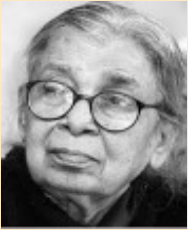
– Ashapurna Debi
Ashapurna Debi (1909-1995) is a prominent Bengali novelist and poet. She has received many awards including Jnanpith and Padma Shri.

Matchbox Summary in English
Page 1: I always compare women to matchboxes. Matchboxes contain enough gun powder to make a hundred Lankas burn. But they sit around meek and innocent in the kitchen, in the pantry, in the bedroom, in fact in any place. Women are the same. Here is an example.
Look at that enormous 3-story house in front. It is Sunday morning. The washer-man has come to collect the soiled clothes. Nomita is the wife and Ajit is the husband. Before handing over Ajit’s dirty clothes, Nomita checks his pockets. She discovers a letter. It was a twisted, crumpled and torn envelope with Nomita’s name on it. Suddenly Nomita is tensed up. She drops the clothes and sits on the bed to read the letter. It had come at least 3 days earlier, as is evident from the postmark.
Ajit had opened and read it. Then he crumpled and twisted it and dropped’if into his pocket. He did not even think it necessary to speak about it to Nomita. She is angry. This is not a casual oversight, but a deliberate action on Ajit’s part.
Page 18: Ajit’s nature is like that. Ajit and Nomita live in a joint family. There are 26 people there. Ajit somehow got the key to the letter box. Whenever he finds a letter addressed to Nomita, he opens it and reads it first. Sometimes he gives the letter to her but sometimes he does not. That is what Nomita thinks. So far Ajit has not discovered any letter that is even slightly suspicious. But his ugly habit will not go. She tried many things to make him stop reading her letter. She showed anger, took offense, tried to shame him and used sarcasm. Nothing worked. He just laughs it away. Sometimes he scolds her.
Nomita now reads the letter. It is from her mother. She goes on complaining about things – the ceiling of her room is cracked and the rainwater falls in. If this is not remedied she may die as the roof comes crashing down. She does not mind death. Her daughter is a queen and her son-in-law is high minded and large-hearted, etc. etc.
Nomita’s mother is a widow. She has no son. She was successful in getting Nomita married into a wealthy family because of Nomita’s looks. The old lady always boasts of her achievement. She always requests for help from Nomita. Whenever Ajit sees a new letter he knows it is for requesting money and so he says, “Why read the letter? I’ll go and fill out a money-order form.”
Nomita feels ashamed. Out of anger and grief, Nomita wrote to her mother not to write on postcards because then everybody would read it. She would send her some money in secret whenever she could manage.
Suddenly Nomita gets angry at her mother. Why does she go on begging like this? Why doesn’t she allow Nomita to keep her self-respect and dignity? She decides to write a letter to her mother telling her that she won’t help her any more:
Ajit comes into the room after having his leisurely Sunday bath. Nomita, terribly angry, asks him when the letter had come. Ajit knows he has made a mistake. He had planned to send some money to Nomita’s mother and throw away the letter. He made a mistake in leaving it in his pocket. As though trying to remember hard, Ajit asks, “Letter? What letter?” Then as if remembering suddenly he says that he was planning to give it to her. But he had forgotten.
Nomita calls him a liar and hisses like a snake. She wanted to know why he had opened her letter. Ajit says he has a right to open his wife’s letter. She says she had repeatedly told him not to open her letters. Ajit tries to laugh the matter away. Jokingly he says, “Shouldn’t I make sure that no one is passing you love letters in secret?”
Nomita explodes in anger. “Stop it! What a common, vulgar man you are!” Ajit can’t continue with his fake smile. He too is enraged.
Page 20: He asks her how could her mother go on begging for money from him and still think they are high-class people. How can a dung-picker’s daughter be a queen? Nomita asks him to shut up. She spoke so loudly that everybody nearby would hear her if she was speaking from the ground floor. But they were on the 3rd floor. Ajit says he won’t shut up and will do what he wants. What can she do about it? She says she can do something. She now does something quite astonishing. She picks up a matchbox lying near and lights a matchstick and touches it to her sari. The sari flares up. Asking if she has gone mad, Ajit comes rushing and puts out the fire using his hands. Now he is a little afraid. He looks at her and he sees fire burning, blazing on her face. He can’t easily put out that fire. He tells her that she loses all common sense when she is angry. How could a woman be so angry!
Nomita was about to say something. But her niece Rini steps into the room. Rini asks her how long the washer-man should wait. If Nomita does not want to give him any clothes, tell him. Fora moment Nomita does not say anything. Then she picks up the dirty clothes and sorts them. She asks Rini to go down and tell the washer¬man to wait for her.
Nomita speaks her mind. No one attacks her outright. But they pinch her with sharp words. Her second sister- in-law is tired with work this morning. When she sees Nomita, she puts a twisted smile and says sarcastically that.it was good that finally she decided to come down. She accuses her of always running to Ajit for her comfort whether there is work at home or not. She asks her if their love-talk will never end.
Nomita looks around. She sees many there. She does not want her voice to tremble. She also puts on a smile and tells the sister-in-law to come to their room and peek. It is not always love-talk, there is also angry talk.
The sister-in-law laughs and says that she should not try to pretend that they are not always talking love. She says she is not foolish. There is no need to peek. Even without peeking, they all know what is happening in the room. Nomita laughs at her and says she is fond of saying naughty things.
The eldest sister-in-law suddenly comes running and asks if she has finished cutting the vegetables. She asks them if they are spending time chitchatting. Suddenly she notices the burned sari of Nomita and asks her how it happened. Nomita is silent for a moment. Then she says she used that part of the sari to lift a hot pot from the stove and that is how it got burned.
Nomita starts peeling potatoes. Secretly she is thinking how she could send some money to her mother. She can’t write and tell her mother that she can’t do anything. The entire village knows Nomita is a queen, and Ajit is large-hearted.
This is why I compare women with matchboxes. Even when they have material within themselves to burn many things, they never flare up to burn away the mask of men’s high-mindedness and their large-heartedness. They don’t burn even their own colourful shells. The men know that. That is why they leave them scattered carelessly in the kitchen, in the pantry, in the bedroom, here, there and everywhere. Without fear, they also put them in their pockets.
Matchbox Summary in Malayalam
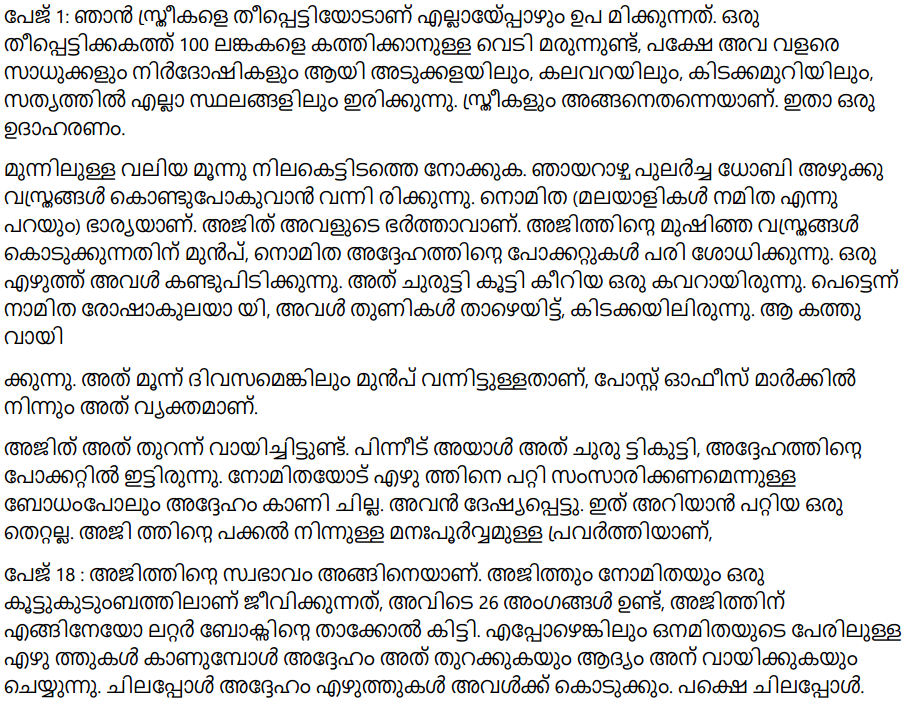

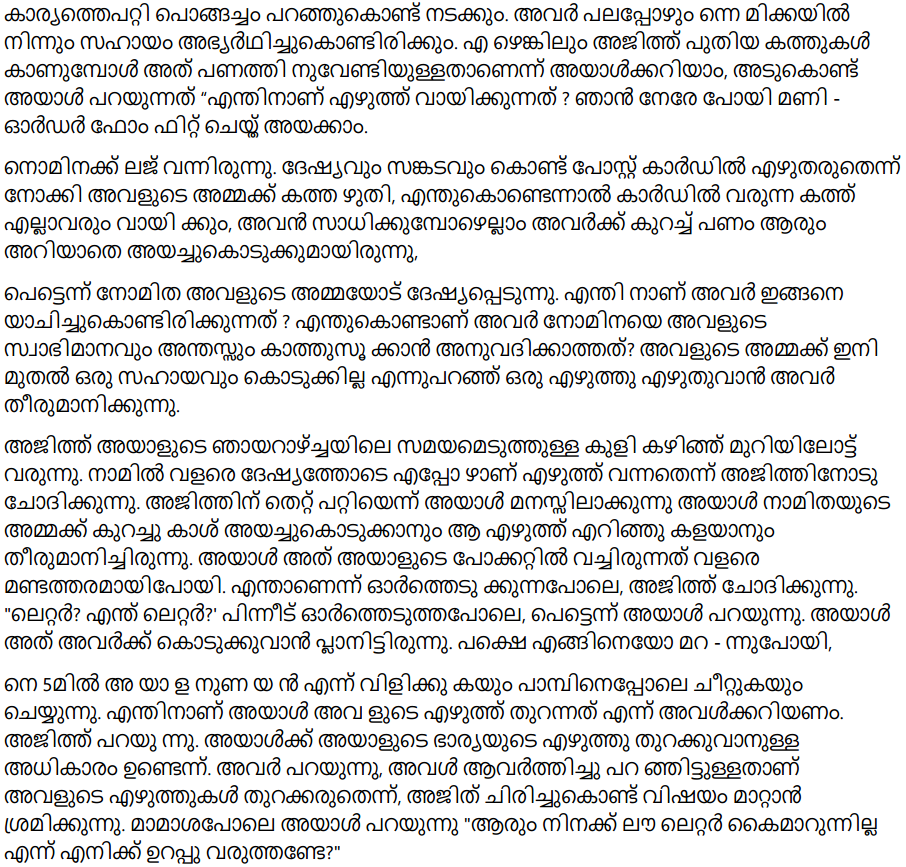
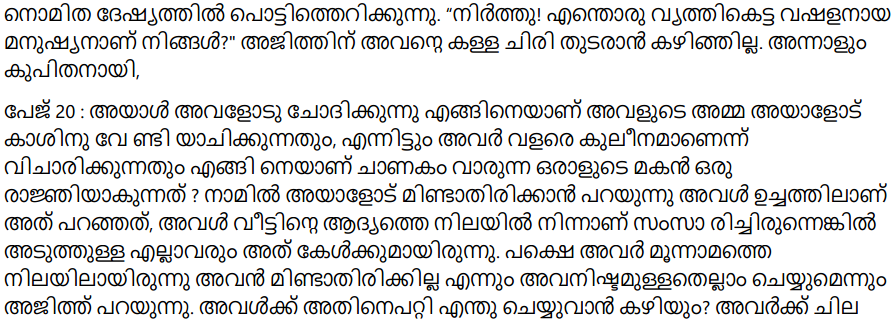
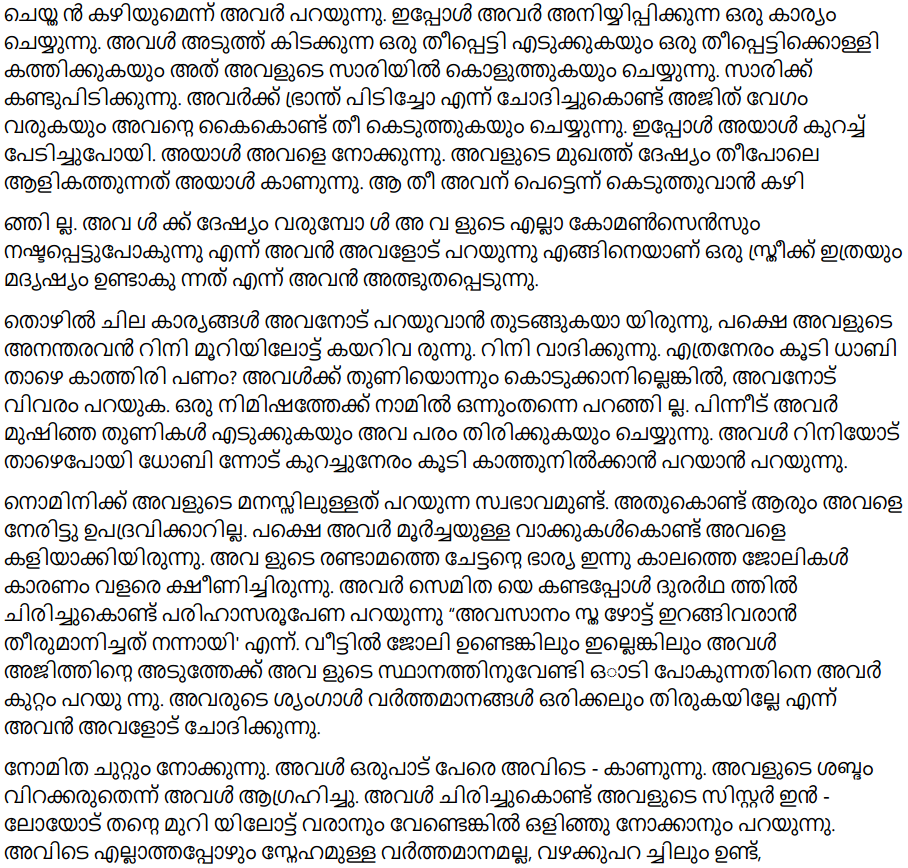
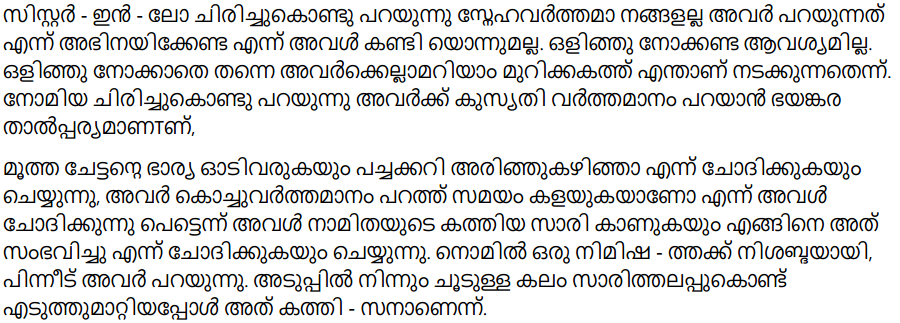

Matchbox Glossary
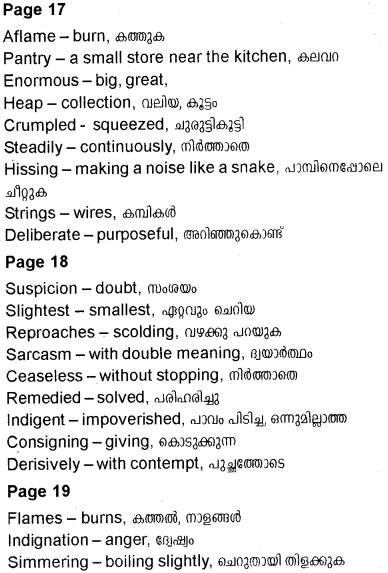

Plus Two English Textbook Answers
The post Matchbox Questions and Answers Plus Two English Textbook Unit 1 Chapter 3 (Story) appeared first on A Plus Topper.
Join the conversation